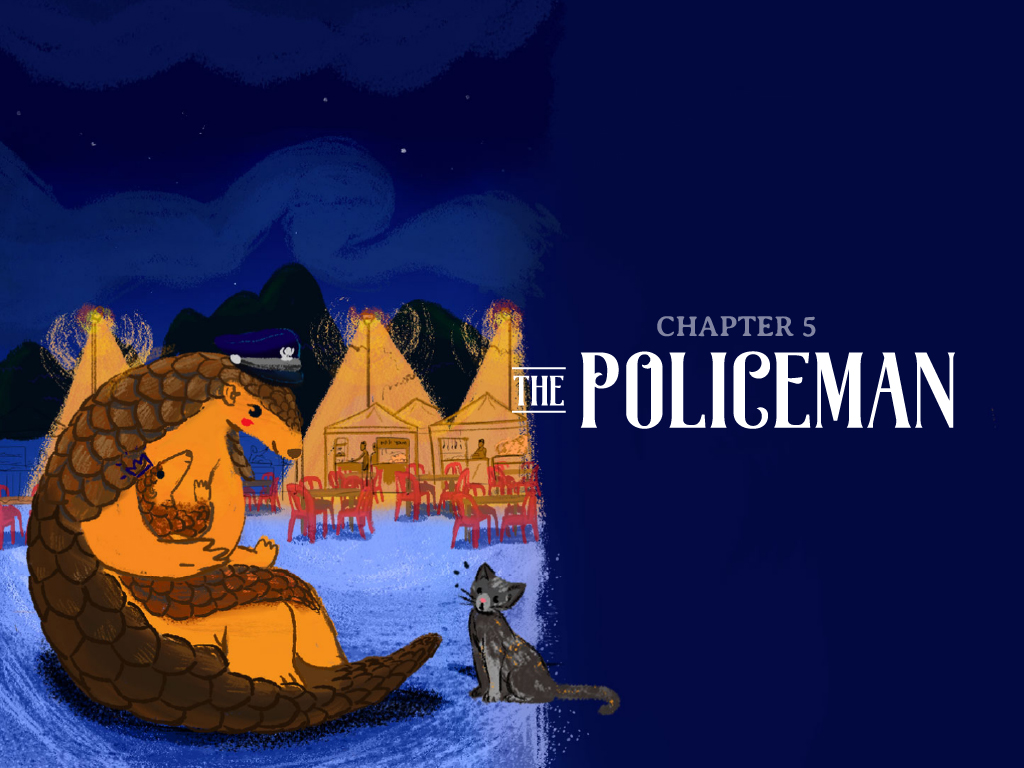


t is late at night in a small suburban town in Kedah, 40 minutes from the Thai border. We’re seated at a table in a roadside food stall. The sparse nighttime traffic whizzes by, everything is tinged orange by streetlight. Just beyond the orange glow, a police station looms in the shadows.
While the police officer tells us how his smuggling ring ran into trouble, his young daughter wails into her father’s chest, recoiling from a stray cat. The officer picks up the cat by the back of its neck and tosses it away for the third time.
It is a scene that is impossible to reconcile. She, no older than six, delicate as an angel, dressed like a princess, complete with a tiara. He, a police officer who helps smuggle pangolins and god knows what else. The cat, who only wants a bite to eat.
“We as underlings, we can’t arrest the smuggling syndicates as they have already made a deal with our supervisors.” - Corrupt policeman
We had met the officer earlier at the Kedah magistrate court, where he is standing trial for being in possession of a large stash of live pangolins.
He is not the first policeman in the dock for this particular offence. Since 2014, four policemen have been arrested, including one who was caught twice, for being in possession of live pangolins. All worked, or are still working at the same police station as the smuggler’s brother-in-law – the Kedah State Police Headquarters. Evidence shown to us by reliable government sources connect as many as nine other officers to the smuggling ring.
“Okay, let me explain,” the policeman begins. “The goods come from Indonesia, and the towkays, they bid for the goods.”
“Goods from Indonesia, it must be at least a tonne. So, one tonne of goods, and the bidding starts. Price starts at RM300 per kg (US$ 72 per kg). Okay, how much can you pay?” He motions towards one of us. “Okay, this one wants to pay RM310.” He motions to another one of us. “Now this one wants to pay RM320. And another one wants to pay RM350.”
“So the one who offered RM350 will get the goods.
But the others know that the goods are arriving, they might not know when exactly, but they know it is coming this week, or in two, three days’ time. So they are ready.”It is a dizzying story of competing syndicates working with enforcement officers, double-crossing each other, all for the chance to trade in pangolins.
“When the goods are available, they already have their target. In fact, I have arrested someone from their team before.”
As the conversation stretched into the night, the web of corruption seemed to grow.
“We have to ask our supervisors first (when we are offered money by the smuggling syndicates),” he says. “If they are okay, we ask our teammates. Some might agree, some might not.”
“If our team is not okay, (the smugglers) will try asking other teams, since we change according to our shifts.“We as underlings, we can’t arrest the smuggling syndicates as they have already made a deal with our supervisors,” he continued.
“Even if we want to work by the rules, we cannot. If someone pays us, we just accept it and keep quiet.”READ: R.AGE’s exclusive exposé on corrupt policemen involved in pangolin smuggling.
We watch his daughter swallow her necklace of plastic pearls, then spit them out, again and again, while he goes on to describe the various contraband that leak through the border, all with the aid of enforcement officers. Fireworks, petrol, rice, cigarettes – anything that one side of the border demands and the other can supply.
“You can even bring elephants across if you want, as long as you pay,” he says. “If you don’t pay, even a bag of rice is illegal.”
It is late at night in a small suburban town in Kedah, 40 minutes from the Thai border. We’re seated at a table in a roadside food stall. The sparse nighttime traffic whizzes by, everything is tinged orange by streetlight. Just beyond the orange glow, a police station looms in the shadows.
While the police officer tells us how his smuggling ring ran into trouble, his young daughter wails into her father’s chest, recoiling from a stray cat. The officer picks up the cat by the back of its neck and tosses it away for the third time.
It is a scene that is impossible to reconcile. She, no older than six, delicate as an angel, dressed like a princess, complete with a tiara. He, a police officer who helps smuggle pangolins and god knows what else. The cat, who only wants a bite to eat.
We had met the officer earlier at the Kedah magistrate court, where he is standing trial for being in possession of a large stash of live pangolins.
He is not the first policeman in the dock for this particular offence. Since 2014, four policemen have been arrested, including one who was caught twice, for being in possession of live pangolins. All worked, or are still working at the same police station as the smuggler’s brother-in-law – the Kedah State Police Headquarters. Evidence shown to us by reliable government sources connect as many as nine other officers to the smuggling ring.
“Okay, let me explain,” the policeman begins. “The goods come from Indonesia, and the towkays, they bid for the goods.”
“Goods from Indonesia, it must be at least a tonne. So, one tonne of goods, and the bidding starts. Price starts at RM300 per kg (US$ 72 per kg). Okay, how much can you pay?” He motions towards one of us. “Okay, this one wants to pay RM310.” He motions to another one of us. “Now this one wants to pay RM320. And another one wants to pay RM350.”
“So the one who offered RM350 will get the goods.
But the others know that the goods are arriving, they might not know when exactly, but they know it is coming this week, or in two, three days’ time. So they are ready.”It is a dizzying story of competing syndicates working with enforcement officers, double-crossing each other, all for the chance to trade in pangolins.
“When the goods are available, they already have their target. In fact, I have arrested someone from their team before.”
As the conversation stretched into the night, the web of corruption seemed to grow.
“We have to ask our supervisors first (when we are offered money by the smuggling syndicates),” he says. “If they are okay, we ask our teammates. Some might agree, some might not.”
“If our team is not okay, (the smugglers) will try asking other teams, since we change according to our shifts.“We as underlings, we can’t arrest the smuggling syndicates as they have already made a deal with our supervisors,” he continued.
“Even if we want to work by the rules, we cannot. If someone pays us, we just accept it and keep quiet.”READ: R.AGE’s exclusive exposé on corrupt policemen involved in pangolin smuggling.
We watch his daughter swallow her necklace of plastic pearls, then spit them out, again and again, while he goes on to describe the various contraband that leak through the border, all with the aid of enforcement officers. Fireworks, petrol, rice, cigarettes – anything that one side of the border demands and the other can supply.
“You can even bring elephants across if you want, as long as you pay,” he says. “If you don’t pay, even a bag of rice is illegal.”